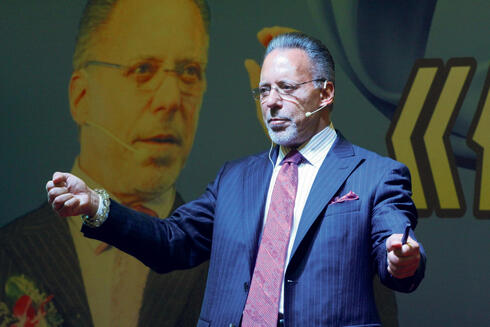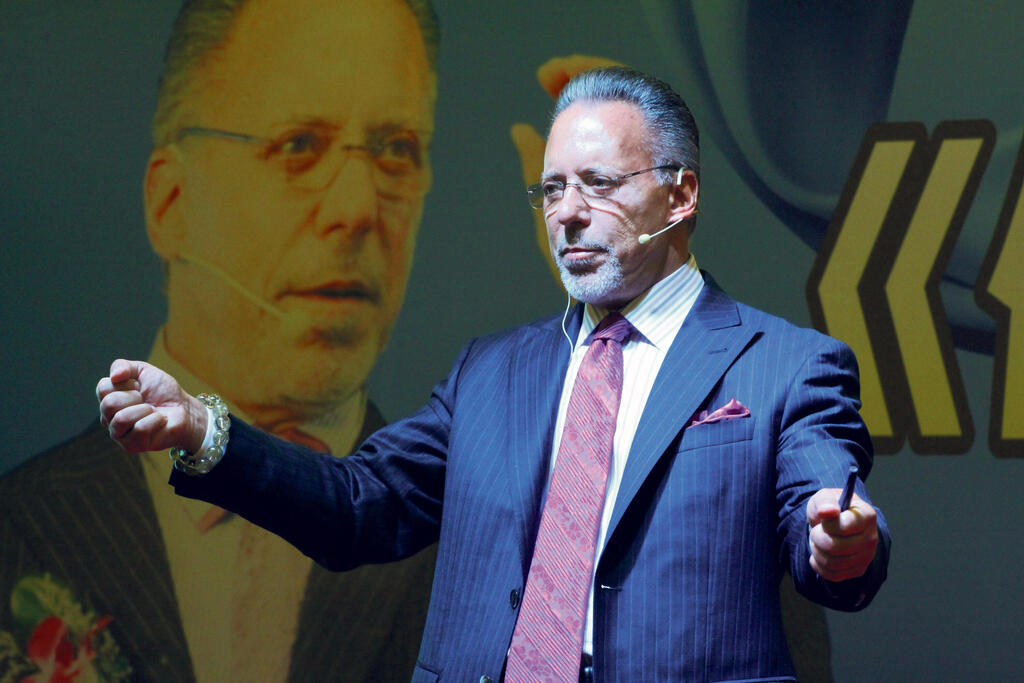
Interview
Marketing guru Jay Abraham: "Israelis are good tacticians, but you need a great strategy"
Abraham, one of the top coaches and marketing people in the world, who advises Microsoft and Toyota, says that "Israel needs to tell its story better and for that you need to build a strategy that appeals to emotion."
Jay Abraham, as one of the top coaches and marketing consultants in the world, from your professional point of view, what is Israel's problem?
"Israelis are good tacticians, but I think you need great strategy. You need great strategy to get the world to buy the truth. From all the meetings I have held in Israel with businesspeople, CEOs and generals, I see that this is true both for the business world and for the marketing of the 'Israel' brand."
Abraham epitomizes the distilled essence of self-help literature in the business domain and embodies the quintessence of coaching. As a highly sought-after consultant and lecturer for decades, his clientele includes major U.S. corporations such as Microsoft, Baskin Robbins, HBO, Holiday Inn, and Toyota, earning him the moniker "The Real Thing" by Forbes magazine, which consistently ranks him among the top five most sought-after coaches in the USA.
At 75, Abraham, who was raised in an Orthodox Jewish family, embarks on his first visit to Israel, primarily as a solidarity gesture. In addition to engaging with business leaders, he delivered lectures at Reichman University's Arison School of Business Administration and met with students and mentors of the "Bereshit" war room, aimed at connecting prominent mentors in Israel with October 7 victims in need of business guidance. Abraham conducts a comprehensive "X-ray" analysis of businesses, uncovering neglected areas. Unfortunately, the results of his analysis of Israel and its business sector are not particularly encouraging.
What do you make of Israel?
"The people I've met are very impressive, enormously smart, intellectually, technologically, very, very detailed, organized hard workers, but they're not great strategists.I heard mostly good tactics from all of them, but there was no strategy behind them. Even one of the IDF commanders with whom I spent quite a bit of time told me: 'It's true, we are a nation of tacticians and so far it's worked great for us'. But following the war, in order for the world to change its mind about Israel and believe you, we must build a strategy."
How do you build a strategy and change the narrative according to which we are the bad guy?
"Israel needs to tell its story better and for that you need to build a strategy that appeals to emotion. It's not easy, but it will be better than an approach based on analytics or arrogance. I felt it firsthand. I visited the Gaza Strip and saw everything there: including the bullets in the walls and the testimonies of families from there. It affected me so emotionally that I couldn't even talk to my wife afterwards. Three things affected me the most and I think will affect others as well: the visuals, meaning the harsh scenes of the events of October 7; the first-hand stories; and the attitude of the people: the spirit of hope, volunteerism and goodwill. The woman who gave us the tour, whose husband was murdered in the attack, said: 'We don't hate, we love, we are optimistic and we will rebuild and live here again.' This message needs to be built strategically, because today you are seen as the bad guys in the story. On the other hand, of course, you should not exaggerate, because if you are too emotional, people will not take you seriously. You have to build a combination of working on emotion backed up by facts and this, in my experience, is what changes people's way of thinking."
It seems easier said than done. We saw for example at the Oscars that no celebrity wore the yellow ribbon pin calling for the return of the Israeli hostages.
"It is indeed very difficult. The world is very divided, there is a lot of hatred and also indifference. I even see my children, they are in their 30s and they don't vote in the U.S. elections. They don't understand what it's like to worry about the lack of basic things like freedom. I also meet many mainstream American business people who do not want to fight for our democracy, they are afraid to rock the boat too much. Israel's mission in the field of advocacy and changing the narrative is to recruit a group of well-known and influential people with a reputation. They should be brought on tours here so that later they will serve as ambassadors and advocates. I can be one of them, but more influential people are needed. Is it easy? No. Is it necessary? Yes".
Related articles:
"Learn to play the long game"
For most of your career you have been advising businesses on how to improve marketing and increase sales, can this be paralleled to improving the "Israel" brand?
"What is similar in all marketing work is that you don't have to sell a feature or some quality of a product, but its result. In the case of Israel, the result you have to sell is that the atrocities that Hamas committed in Israel can be repeated - here or in another country."
Let's talk about the Israelis as businesspeople. Israel of peacetime is branded as a "startup nation", that's good, but on the other hand, few manage to develop huge companies here. Where are the Israeli entrepreneurs going wrong?
"This is indeed what I have heard from many entrepreneurs I have met: that they reach a certain sales threshold and then start looking for a buyer. And this is a mistake, because the greatest opportunity is in the stages that follow. To get there, patience is required. You have to learn to play a completely different game: a long game, with different time constants This game requires different resources and the creation of collaborations."
What does a longer game and different resources mean?
"Before I came on this visit organized by the entrepreneurs Lior Navon and Allon Khakshouri (who used to be Novak Djokovic's manager) for four weeks I held many introductory meetings with Israeli businessmen from different fields. They presented me with their biggest challenge and the biggest opportunity most of which they have not yet been able to leverage, and I offered them a solution. From what I saw and experienced, none of them were good marketing people or good strategists, and these were your best companies in Israel, public and private.
"I usually send a questionnaire of 200 questions when I start working with a manager, and most of them don't know how to answer half of the questions, I'm not exaggerating. These are critical questions such as how much it really costs you to acquire a customer, why you do something in a certain way and not another way, has anyone at any time dedicated some thought to this? For example, a large number of companies are based on word-of-mouth marketing. I ask them - 'What is the method here? Do you have an organized system? Do you have one strategy? How many strategies?' Because in practice there are about 125 different ways to systematically receive referrals from clients.
"Another case is a CEO who tells me that he can't make money because the salespeople can't sell the product properly. In such a case I ask: 'What tools do you give the sales people? Have you tried different approaches? How do you reward the salespeople?' Most of the CEOs answer me that they reward the salespeople with a generous bonus, but it is possible to reward them differently. If a salesperson brought you a client who is going to generate hundreds of thousands of dollars in revenue for you in a few years, you should think about paying him more from the beginning, and not spread the reward over the years of the contract, to make this salesman more motivated."
"The CEO is not the smartest man in the room"
These sound like failures we see everywhere. What is unique about Israeli managers? What are they missing?
"Almost all the Israeli managers told me overwhelmingly that they don't like business collaborations. In the 2,000 largest companies in the U.S., 20% of the revenue comes through the business partners, from joint branding, from being the recommended supplier and from joint ventures - and they generate 40% of the profit for the company."
Are you implying that the Israelis do not like to share?
"If you are unable or unwilling to share, that means you need to recruit more salespeople. These need to be smarter than the manager in non-technological areas. As soon as the entrepreneurs are unable to do that either, they end up on the track of selling their company very early, because they are actually their own worst enemy. I hope I'm not being insulting when I say this."
How do you explain this gap? Where do American managers learn to be more strategic? Is it a matter of studying at the reputed universities or a cultural matter, such as the well-known impatience of the Israelis?
"I think it's a combination. In the U.S., they do know how to teach strategy well, and the culture is more oriented towards playing for the long term. Israelis are very entrepreneurial in the purest sense of the word, while in the U.S. many of those who call themselves entrepreneurs are actually more business owners. A true entrepreneur needs to understand the value creation process, not in the sense of exciting technology, but how it improves the customers' lives. When a person goes to a store to buy a drill, they don’t really want a drill, but a hole in the wall, and they don’t really want a hole, but to attach something to the wall, and they don’t really want to attach something to the wall, but to hang a TV to watch Netflix. This is the difference between the technology that allows drilling a hole and the benefit for the customer, which is watching TV."
So what are the main challenges facing Israeli managers and how are they solved?
"Many companies can afford to hire the best and most expensive salespeople. You have to do it, and then you only cry once - when you sign their salary agreement. But in practice, and this is mostly typical of high-tech companies, the entrepreneur who is the CEO thinks they are the smartest person In the room - in every room. I say that 'if you think you're the smartest person in the room, you're probably in the wrong room.' Many tech entrepreneurs treat companies like their baby and that's true, but a good parent wants their baby to grow and develop and not be an exact copy of them. The child needs to go out into the big world and surpass the parents, learning things from other people."














